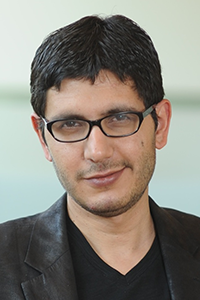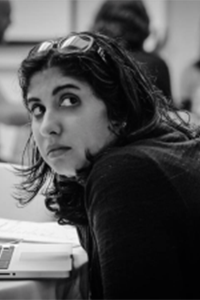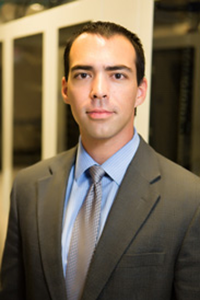10:00 to 11:00 AM, October 27, 2015
Ida Noyes Hall, 1212 E. 59th Street, Chicago, IL 60637
Sponsored by UChicagoGRAD and the Research Computing Center
Come learn about what computation can do for you and your future career. There are two concurrent panels—one for careers in the digital humanities, and one for computational science, technology, engineering, and mathematics (STEM) careers.
To register for this event, please click here.
Panel 1: Careers in Digital Humanities
Jennifer Guiliano
Jennifer Guiliano received a bachelors of arts in English and history from Miami University (2000), a masters of arts in history from Miami University (2002), and a masters of arts (2004) in American history from the University of Illinois before completing her Ph.D. in history at the University of Illinois (2010). She currently holds a position as assistant professor in the Department of History at the Indiana University-Purdue University Indianapolis.
Alex Gil
Alex Gil is Digital Scholarship Coordinator for the Humanities and History, and Affiliate Faculty of the English and Comparative Literature Department at Columbia University. He specializes in twentieth-century Caribbean literature and digital humanities, with an emphasis on textual studies. He has published in journals in Canada, France, and the United States, while sustaining an open and robust online research presence. In 2010-2012 he was a fellow at the Scholars' Lab and NINES at the University of Virginia. He now serves as vice chair of the Global Outlook: Digital Humanities initiative and is actively engaged in several digital humanities projects at Columbia University and around the world.
Roopika Risam
Roopika Risam joined the Salem State University faculty in 2013. She serves as assistant professor of English, coordinator of the secondary education English undergraduate program, and coordinator of the Digital Studies Graduate Certificate Program. She is finishing a monograph on the intersections of postcolonial studies and digital humanities, which is under contract with Northwestern University Press. Her other major project examines postcolonial and global themes in W.E.B. Du Bois’ writing. Additionally, she is the co-founder of Postcolonial Digital Humanities, a movement and emerging academic subfield within digital humanities that foregrounds global explorations of race, class, gender, sexuality, and disability within cultures of technology. Her work has recently appeared in Digital Humanities Quarterly; Ada: A Journal of Gender, New Media, and Technology; and Left History.
Panel 2: Careers in Computational STEM
Michael D’Mello
Michael D'Mello has spent the last 24 years in the computer industry specializing in parallel computing. Past employers include Thinking Machines Corporation, Convex Computer Corporation, and the Hewlett-Packard Company. He has been with Intel since 2003 and is currently a program manager and a senior technical consulting engineer in Intel's Developer Products Division. His primary interest is in the area of code optimization with a special focus on computing patterns commonly seen in the financial, energy, healthcare, and scientific computing verticals. He has been credited with influencing some of the most notable performance gains obtained by the division he represents. He holds a PhD in chemical physics from the University of Texas, Austin.
Nicholas Labello
Nicholas Labello received a B.S. in chemistry from Southeastern Louisiana University and a Ph.D. in physical and computational chemistry from the University of Memphis in 2006. He then performed postdoctoral research at the University of Minnesota Center for Drug Design until joining the Minnesota Supercomputing Institute as a Computational Biochemistry Consultant in 2008. In 2011, he accepted the position of Scientific Computing Consultant at the University of Chicago Research Computing Center. In 2014, Nicholas joined the Computational Sciences Center of Emphasis at Pfizer. In his current Principal Scientist role Nicholas supports and develops computational solutions to problems faced in the pharmaceutical industry.
James Foster
James Foster is the Director of Industrial Process Development Research for the Archer Daniels Midland Company. Foster has numerous publications and 17 patents to his credit and is on the advisory board for the Iowa State University Center for Crops Utilization Research, and completed two terms on the board the University of Illinois Department of Agricultural and Biological Engineering. He was a keynote speaker at the 2008 and the 2014 AICHE Midwest Regional Conference and at numerous manufacturing analytics conferences. His education includes a BS in chemistry and BS in mathematics from Loyola University, MS and PhD in chemical engineering from the University of Illinois, and a masters in analytics at the University of Chicago in 2015. After working for 15 years in the pulp and paper industry, for the last 16 years he has worked for Archer Daniels Midland.
Benedict Augustine
Benedict Augustine is a Lead Data Scientist at Uptake Technologies, a company focused on developing analytics products in the industrial Internet of Things (IOT) space. A recent graduate of the UChicago Analytics program, Benedict has 10 years of management consulting experience working with CxOs to drive the design and execution of data driven business strategies while working across disciplines of Business Strategy, Analytics and Technology. Benedict has multi-industry experience, most recently in heavy machinery IOT and prior experience in banking, retail analytics, healthcare analytics, life sciences, and advertising.
Digital Careers is being held as part of Mind Bytes, the Research Computing Center’s annual research computing expo and symposium.
Please RSVP by registering on the Mind Bytes website.
Questions? Please contact Kristy Rawson at UChicagoGRAD, at 773.702.3999 or rawson@uchicago.edu.









